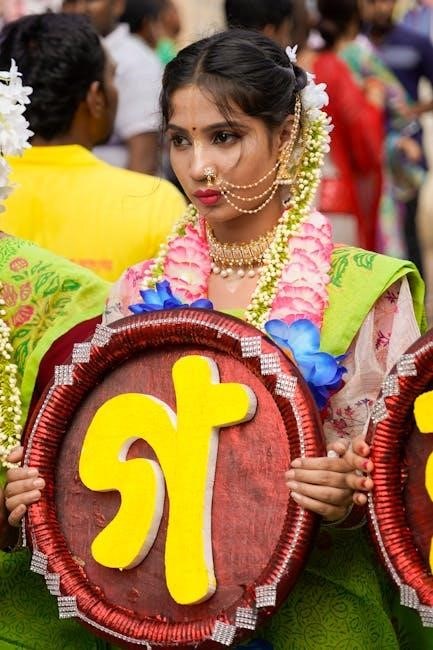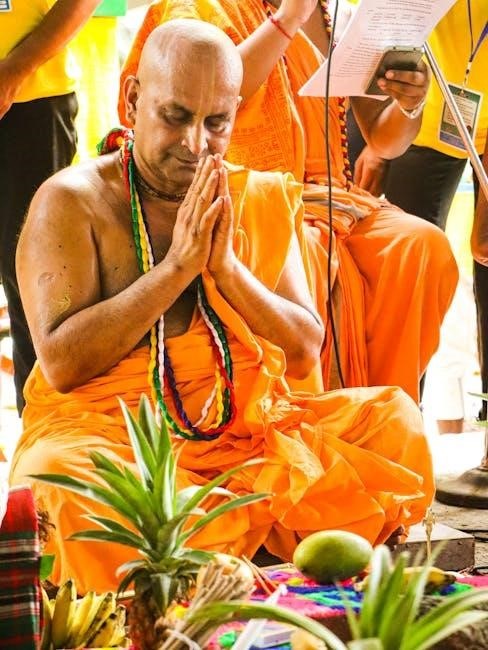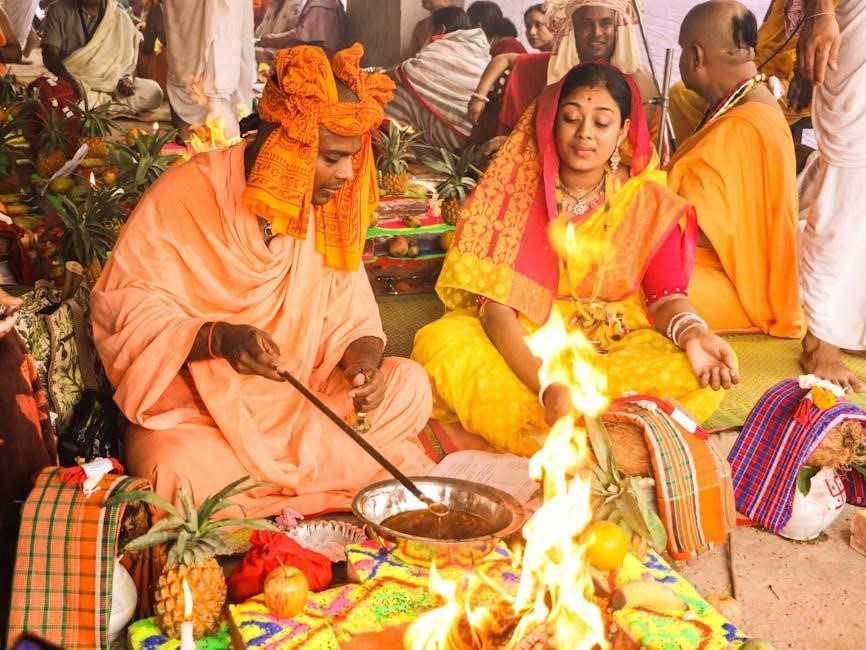
purusha suktam pdf
Purusha Sukta is a revered Vedic hymn from the Rigveda (10.90) and Yajurveda, glorifying the cosmic being Purusha, the source of creation. Its PDF versions are widely available in Sanskrit and English.
1.1 Overview of Purusha Sukta
Purusha Sukta is a sacred Vedic hymn describing the cosmic being Purusha, the source of creation. It consists of 16 verses, detailing Purusha’s attributes and the universe’s origin. The hymn is central to Vedic philosophy, exploring themes of existence, sacrifice, and cosmic order. Its verses are often recited in rituals and ceremonies, emphasizing spiritual harmony. PDF versions of Purusha Sukta are widely available in Sanskrit and English, offering insights into its profound symbolism and cultural significance.
1;2 Importance in Vedic Literature
Purusha Sukta holds a central place in Vedic literature, being one of the most cited and revered hymns. It is foundational to understanding Vedic philosophy, detailing the cosmic order and the origins of creation. The hymn is integral to rituals and ceremonies, emphasizing spiritual harmony and the unity of existence. Its profound symbolism and philosophical depth have made it a cornerstone of Hindu thought, influencing various interpretations and commentaries across centuries.

Origins and Background
Purusha Sukta originates from the Rigveda (10.90) and is also present in the Shukla Yajurveda (Vajasaneyi Samhita, Chapter 31). It is a key Vedic hymn describing the cosmic being Purusha and the creation of the universe, emphasizing his role as the source of all existence.
2.1 Vedic Context and Sources
Purusha Sukta is found in the Rigveda (10.90) and Shukla Yajurveda (Vajasaneyi Samhita, Chapter 31). It consists of 16 verses, describing Purusha as the cosmic being from whom the universe and humanity originate. The hymn is integral to Vedic philosophy, emphasizing creation, sacrifice, and the interconnectedness of all existence. PDF versions of Purusha Sukta are widely available in Sanskrit and English, preserving its ancient wisdom for modern accessibility and spiritual reflection, with sources like Vaidika Vignanam offering free downloads (5 pages, 0.14 MB).
2.2 Purusha Sukta in Rigveda and Yajurveda
Purusha Sukta is prominently featured in the Rigveda (10.90) and the Shukla Yajurveda (Vajasaneyi Samhita, Chapter 31). The Rigvedic version consists of 16 verses, detailing the cosmic being Purusha as the source of creation. The Yajurvedic version, while similar, emphasizes ritual and cosmic order. Both texts highlight Purusha’s sacrifice and the emergence of the universe, with PDF versions of these scriptures widely available for study and reflection in Sanskrit and English, preserving their spiritual and philosophical significance.

Structure and Composition
Purusha Sukta consists of 16 verses, primarily in the Tristubh meter, rich in poetic imagery and symbolic language, conveying profound cosmic and philosophical truths.
3.1 Verses and Their Meanings
Purusha Sukta comprises 16 verses, each rich in cosmic symbolism. The hymn describes Purusha as a thousand-headed, thousand-eyed being, pervading the universe. Key verses explain creation through his sacrifice, yielding the cosmos, humans, and the social order. The text also emphasizes Purusha’s omnipresence, sustaining life and non-life alike. PDF versions often include translations, making these profound meanings accessible for spiritual and intellectual exploration, while preserving the hymn’s Vedic essence and philosophical depth.
3.2 Linguistic and Poetic Features
Purusha Sukta is composed in archaic Sanskrit, showcasing rich poetic imagery and symbolism. Its verses employ rhythmic meter, enhancing chantability. Key terms like “Sahasra Sīrsha Purusha” highlight cosmic grandeur. Symbolic numbers, such as three-quarters and one-quarter, convey profound philosophical ideas. The hymn’s language is both concise and profound, blending spiritual and poetic elements. PDF versions often include commentary, aiding deeper understanding of its linguistic nuances and theological significance, making it accessible for both scholars and devotees seeking spiritual insight.

Philosophical and Spiritual Significance
Purusha Sukta embodies profound spiritual truths, portraying Purusha as the ultimate cosmic reality. It explores creation, sacrifice, and the eternal cycle of existence, offering deep philosophical insights into the universe and human consciousness.
4.1 Concept of Purusha as the Cosmic Being
Purusha, the cosmic being, is depicted as the ultimate reality, with a thousand heads, eyes, and legs, pervading the universe. The hymn describes him as the source of creation, from whose sacrifice the world and all beings emerge. He transcends the material world, yet is immanent in all existence, embodying the unity and diversity of cosmic order. This concept symbolizes the divine essence underlying all creation, making Purusha a central philosophical and spiritual idea in Vedic thought.
4.2 The Cycle of Creation and Sacrifice
The Purusha Sukta describes the cosmic cycle of creation through the sacrifice of Purusha, the primordial being. From his sacrifice, the universe, gods, humans, and all existence emerge. The hymn elaborates that three-quarters of Purusha remain transcendent, while one-quarter manifests as the dynamic universe. This cycle symbolizes the eternal process of creation, preservation, and dissolution, emphasizing sacrifice as the fundamental principle sustaining cosmic order and the interconnectedness of all beings. This philosophical framework underscores the Vedic understanding of existence and cosmic evolution.

Rituals and Recitation
Purusha Sukta is integral to Vedic rituals, often recited during sacrifices and ceremonies. Its chanting is believed to invoke divine blessings and foster spiritual growth.
5.1 Role in Vedic Rituals and Ceremonies
Purusha Sukta holds a central place in Vedic rituals, particularly in sacrificial ceremonies (yajnas). It is often recited to invoke the cosmic being Purusha, symbolizing the universe’s creation and order. The hymn is chanted during rituals like the Agnihotra and Somayaga, emphasizing its role in maintaining cosmic harmony. Its recitation is believed to bring spiritual purification, prosperity, and divine blessings. As part of Vedic liturgy, Purusha Sukta is integral to both domestic and public ceremonies, reflecting its enduring significance in Hindu tradition.
5.2 Proper Way to Recite Purusha Sukta
The proper recitation of Purusha Sukta requires a pure state of mind and body. It is ideally recited during the early morning or evening, facing east. One should sit in a meditative posture, maintaining focus and calm. The hymn must be recited with precise pronunciation and intonation, adhering to Vedic swaras. Many PDF guides provide phonetic transliterations and rituals to follow. Recitation is often performed after purification rites and is considered most effective when done with devotion and adherence to traditional practices.
Availability of Purusha Sukta in PDF
Purusha Sukta PDFs are freely available online in Sanskrit, English, and other languages, offering translations, commentaries, and guides for recitation and understanding.
6.1 Sources for Downloading the PDF
Purusha Sukta PDFs are available on platforms like Vaidika Vignanam, Scribd, and Archive.org. These sources offer free downloads in various formats, including PDF, Word Doc, and Text File. Many websites provide translations in English, Sanskrit, and other languages, catering to diverse audiences. Some platforms also include commentaries and guides for deeper understanding. Users can easily access these resources by searching for “Purusha Sukta PDF” or visiting specific Vedic literature repositories online.
6.2 Language Versions (Sanskrit, English, etc.)
Purusha Sukta is available in multiple language versions, including Sanskrit, English, Hindi, Telugu, Tamil, and Malayalam. These translations cater to diverse linguistic preferences, ensuring accessibility for global audiences. PDFs often feature the original Sanskrit text alongside English translations, facilitating understanding for non-Sanskrit speakers. Some versions also include commentaries and explanations, enhancing spiritual and intellectual comprehension. The availability of these language versions highlights the universal appeal and timeless relevance of Purusha Sukta in modern times.

Cultural and Historical Impact
Purusha Sukta profoundly influenced Hindu philosophy, shaping concepts of the cosmic being and creation. Its verses are integral to rituals and referenced in Upanishads, emphasizing its enduring cultural significance.
7.1 Influence on Hindu Philosophy and Culture
Purusha Sukta has deeply shaped Hindu philosophy, presenting the concept of Purusha as the cosmic being from whom the universe originates. It influenced Vedanta and Upanishads, emphasizing the unity of existence. Culturally, it is integral to rituals and is often recited in ceremonies, reinforcing its spiritual significance. The sukta’s imagery of creation and sacrifice has inspired artistic and literary works, embedding it in India’s cultural fabric and spiritual practices for centuries.
7.2 References in Other Scriptures and Texts
Purusha Sukta is referenced in various Hindu scriptures, including the Upanishads and Brahmanas, where its themes of cosmic order and creation are elaborated. The Taittiriya Brahmana and other Vedic texts cite it in rituals and philosophical discussions. Its influence extends to later Hindu texts, where Purusha is often invoked in ceremonies like the Purusha Sukta Yajna. This sukta’s verses are also found in secondary Vedic literature, underscoring its enduring relevance in Hindu thought and practice across centuries.

Purusha Sukta and Modern Relevance
Purusha Sukta’s eternal themes of cosmic unity and sacrifice inspire modern seekers, offering spiritual guidance and fostering a deeper understanding of existence and universal interconnectedness.
8.1 Spiritual and Intellectual Significance Today
Purusha Sukta holds profound spiritual and intellectual relevance today, offering insights into cosmic unity and the essence of existence. Its themes of sacrifice and creation resonate deeply, guiding modern seekers in meditation and self-reflection. The hymn’s universal truths transcend time, making it a vital text for understanding interconnectedness. Available in PDF formats, it remains accessible for contemporary spiritual exploration, bridging ancient wisdom with modern intellectual and devotional practices.
8.2 Applications in Meditation and Worship
Purusha Sukta is integral to meditation and worship, its verses invoked to seek divine grace and inner peace. PDF versions facilitate easy access for recitation, enabling devotees to connect with cosmic consciousness. The hymn’s chanting during rituals and personal reflection fosters spiritual growth and harmony. Its universal appeal makes it a cornerstone in both collective worship and individual meditation practices, enriching the spiritual journey of modern seekers.
Purusha Sukta, a sacred Vedic hymn, remains a cornerstone of spiritual and intellectual exploration. Its availability in PDF formats ensures timeless accessibility, inspiring seekers globally with its profound wisdom.
9.1 Summary of Key Points
Purusha Sukta, a sacred Vedic hymn, explores the cosmic being Purusha, the source of creation and the universe. Found in Rigveda (10.90) and Yajurveda, it describes Purusha’s role in cosmic evolution and sacrifice. The hymn is available in PDF formats in Sanskrit and English, enabling easy access for spiritual seekers. Its verses highlight the cycle of creation, the interconnectedness of all beings, and the philosophical underpinnings of Vedic thought. This ancient text remains a cornerstone of Hindu philosophy, offering profound insights into existence and spirituality.
9.2 Final Thoughts on the Importance of Purusha Sukta
Purusha Sukta holds profound significance as a foundational Vedic text, offering insights into cosmic order and the nature of existence. Its availability in PDF formats ensures accessibility for modern seekers, preserving ancient wisdom. The hymn’s themes of creation, sacrifice, and unity resonate deeply, making it a cornerstone of Hindu philosophy. Its influence on rituals, culture, and spiritual practices underscores its enduring relevance, providing guidance for meditation, worship, and understanding the divine. It remains a timeless bridge between the ancient and the contemporary, enriching spiritual and intellectual journeys.